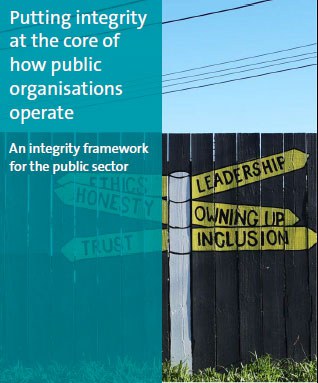Preface
Please note: There is an updated version of this framework.
E ngā mana, e ngā reo, e ngā karangarangatanga maha o te motu, tēnā koutou.
 A high-trust public sector is one of New Zealand's greatest assets
A high-trust public sector is one of New Zealand's greatest assets
Trust and confidence in the New Zealand public sector rank among the highest in the world. Since the inception of Transparency International's corruption perceptions index in 1995, New Zealand's public sector has been consistently ranked one of the least-perceived corrupt in the world. New Zealanders also report high levels of trust in the public service.1
However, it is important that these broad results do not create complacency. We need to stay vigilant and ensure that this trust is maintained over time. We also know that trust is not equally shared by all parts of society – for example, surveys suggest that Māori, Pasifika, and people with disabilities have lower levels of trust in the public service than the general population.2
Public organisations need to show that they are trustworthy
To maintain public trust and confidence, public organisations need to show that they are trustworthy and that they act in the interests of all New Zealanders.
Trust is built and maintained through competence, reliability, and honesty,3 as well as the building of genuine and sound relationships between the public sector and the public it serves.4 That means the public sector must be accountable for the management and delivery of public services and outcomes, for the direction and control of the work it does, the resources it manages, and for its behaviour and ethics.
Where there is a question about any one of these characteristics, trust can be eroded. Simply put, people care at least as much about how things are done as they do about what is done.
Integrity is essential to public trust
Overall, New Zealand's public sector is one that we can be proud of. It is well led, with staff at all levels focused on doing the right thing. However, experience shows that integrity issues can quickly undermine trust and it takes only a few examples to significantly affect the whole sector.
We know trust, when lost, can take a long time to rebuild. This is particularly so when an integrity failure occurs in a public organisation.
An integrity failure can arise from, for example, fraudulent behaviour, mismanagement of conflicts of interest, sensitive expenditure, override of a process or control, or a lack of cultural capability.
Integrity is not easy
Integrity is often assumed. Public sector employees are expected to comply with relevant laws or rules; to be fair, impartial, responsible, and trustworthy; and to be imbued with a spirit of service. Public sector employees come to work to make a positive difference, to comply with the law (or applicable rules), and to behave ethically. It is expected that those who do not are dealt with appropriately.
But integrity is not that simple. Individuals have an innate ability to rationalise their behaviour depending on the situation they face.5 Decisions about whether sensitive expenditure is appropriate, whether an interpretation of a procurement policy is reasonable, or whether performance issues should be reported publicly will depend on the context.
No set of policies, rules, or compliance functions will cover every situation. People can usually convince themselves that, no matter what decision was made, it was made with integrity.
Added to that, individuals see situations differently – one person's gift given to recognise a business relationship may be seen by others as a bribe. Cultural differences can influence what is considered appropriate in different circumstances. As a result, research points to the need for a more holistic approach to building commonly understood values and a culture of integrity at an organisational level.
For these reasons, my Office has done work to help support leaders throughout the wider public sector take a whole-of-organisation approach to building a culture of integrity in their organisations. We consider this approach applies to all tax-payer and rate-payer funded organisations.
How my staff went about the work
In developing this framework and guidance, my staff reviewed New Zealand and international research on organisational integrity. They analysed integrity models from New Zealand and other jurisdictions and recommendations from New Zealand integrity-related reviews.6
We have tested the framework by talking to experts and academics in the integrity and ethics fields and carrying out interviews and case studies with public organisations already working on these matters.7
My staff interviewed and held workshops with senior leaders, people leaders, and front-line staff in local and central government organisations. They also had discussions with agencies with a role to play in influencing ethics and integrity in the public sector. This has included Te Kawa Mataaho Public Service Commission, Transparency International New Zealand (TINZ), and the Serious Fraud Office.
This framework is partially informed by Māori frameworks, mostly in the "ways of working" component.8 My staff also used insights from kaupapa Māori research and some work I commissioned on Māori perspectives on accountability.9 However, I acknowledge that we have more work to do to fully integrate te ao Māori into the framework and to provide guidance on demonstrating integrity to Māori. This will be the focus of the next phase of work on the framework and guidance. I welcome input and feedback on this aspect of the framework.
I want to help public organisations get it right
This integrity framework aims to support senior leaders and those in governance roles to deliver on their stewardship responsibility to support the integrity of New Zealand's public sector. It is designed to build on a public organisation's own cultural and ethical values, emphasise the importance of ethical leadership and tone from the top, and leverage existing internal controls and business practices.
My Office is one of several that has a role to play in leading and supporting integrity in the public sector. In particular, I note the role of Te Kawa Mataaho Public Service Commission, which has a role in promoting integrity in state services agencies by setting standards and issuing guidance. This framework is intended to be consistent with those standards and guidance and refers to them throughout, where relevant.
I urge chief executives, leadership teams, and governing boards to consider this framework in the context of their organisations. It is intended to serve as helpful guidance for all public organisations, including both central and local government. I hope that this will enable a more holistic and mature approach to supporting integrity and, in turn, continue to protect and improve the high trust and confidence that New Zealanders have in our public sector.
Nāku noa, nā
John Ryan
Controller and Auditor-General
13 June 2022
1: Te Kawa Mataaho Public Service Commission (2021), Trust and confidence in the Public Service.
2: See the Kiwis count survey at www.publicservice.govt.nz/our-work/kiwis-count.
3: Office of the Auditor-General (2019), Public accountability: A matter of trust and confidence.
4: See the report (forthcoming) that we commissioned on Māori perspectives on accountability.
5: Ashkenas, Ron (2011), "Why integrity is never easy", Harvard Business Review.
6: New Zealand Defence Force, Civil Aviation Authority, New Zealand Law Society, Fire and Emergency New Zealand, Parliament, Sport New Zealand, and New Zealand Police.
7: We have used quotes from the reviews and case studies in this guidance.
8: For example, Te Ara Tika Guidelines for Māori Research Ethics at hrc.govt.nz and He Ara Waiora at treasury.govt.nz.
9: See the report (forthcoming) that we commissioned on Māori perspectives on accountability.

